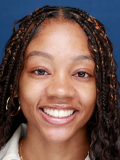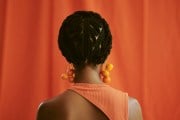Behind the curls, shears and pressing combs, Black women beauticians have a long history of strengthening their communities, engaging in political activism and working against anti-Black ideology.
The Black beauty salon is a primary example of a Black woman-owned, run and patronized business. Often referred to as “the shop,” this place of pampering remains a safe space for Black women to organize and have open conversations about their truths. And of course, get their hair done.
Whether engaging in political organizing, enhancing economic growth, or serving as a source of relaxation, the Black beauty shop has curated a defiant history and unique experience. The women who own and work in these shops have done far more for the advancement of Black communities than meets the eye.
“[Beauticians] had the three elements that were really essential for a lot of political grassroots, political mobilizing. They had access to women’s lives, they had access to space, and they had their own economic capital,” said Tiffany Gill, author of “Beauty Shop Politics: African American Women’s Activism in the Beauty Industry,” and an associate professor of history at Rutgers University.

Similar to well-known political gathering sites like Black churches, beauty shops have hosted voter registration drives and citizenship education schools, and distributed pamphlets and resources. The unique power of the shop has been the ability for political activity to be swept under the rug, like discarded hair, when open organizing was not safe.
“I think beauticians were really good at using their subversive nature. ‘It’s just women in there getting their hair done. They’re just gossiping’ was always the assumption,” Gill said.
The act of beautifying Black women has itself been a political act, she said.
“Starting from the late 19th [to] early 20th century [and] looking at the first group of Black women, the first generation after slavery, [they were] really trying to recreate their lives as modern women and part of that modern woman was both a political aesthetic but also, a beauty aesthetic,” Gill said.
“I think we can’t divorce the fact that these are practitioners that are involved with beautifying Black women. In a time, and we could even argue this today, when Black women are vilified and thought of as ugly, there’s something very empowering [and] very dignifying about having something that is about not making you beautiful, but enhancing your beauty,” she added.
The haircare industry has also been an economic driver for Black women for generations, offering the opportunity for entrepreneurship away from the labor-intensive work in other predominantly Black fields.
It’s not surprising, then, that Madame C.J. Walker, listed in the Guinness Book of World Records as America’s first female self-made millionaire, made her fortune and empowered thousands of fellow Black entrepreneurs through hair care.
Walker was born to two sharecroppers in Louisiana and spent years as a farm laborer and laundress before creating an empire of Black hair growth products. She sold and marketed products door to door across the country, eventually training other women to do the same.

“This business where women could sell her products, they could style hair, they could organize themselves. They did not have to work for somebody White: washing their clothes, cooking their food, cleaning their houses, picking their cotton. So, she was helping women become economically independent,” said A’Lelia Bundles, a journalist and Walker’s great- great-granddaughter.
Walker also had a passion for strengthening Black communities, supporting causes like the YMCA and the NAACP’s anti-lynching movement with funding and resources.
The idea of community has remained at the center of beauticians’ work. Alongside providing economic opportunities to their local communities, they have exemplified what it means to build healing relationships with those they serve.
“You may walk in not feeling great. You may think you don’t look great, and there’s somebody who is there to sort of boost your spirits. They’re people who have known you for a while,” Bundles said. “Your beautician is somebody who knows when you’re growing up, when you’re graduating from high school, when you get engaged, when you get married. A lifelong beautician is somebody who really has seen you in all phases of your life.”
-
Read Next:
The ability to be taken care of and listened to is sacred for many women. Having been in the professional hair industry for over 10 years, Adea McKnight describes the work she does as a needed pause for her clients.
“Everytime I work with a different client it’s like a therapy session. Women come to the salon to get away from their everyday life. Maybe they have kids, they have a job, they have a [partner], and when they come to the salon it’s like those jobs are put to the side for a second,” McKnight said.
Beauty shops and beauticians have created the center of Black beauty while making room for the Black woman’s perspective to be shamelessly expressed and strengthened.
“Hair care became a means to an end to create confidence for women, to help them become economically independent, to help them to become leaders in the community, to help them make a difference,” Bundles said.







